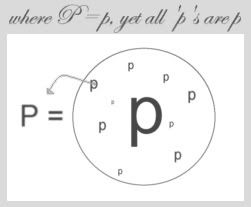_Z_
from far far away
nothing is omnipresent
omnipresence itself is a given, all things are present. that something is or has omnipresence contradicts this...
can we have something that is omnipresence other than omnipresence itself? in order to do so we must extrapolate ‘x’ presence from omnipresence ~ let us imagine a circle within which are all presences, to make a given thing have the quality of omnipresence we must take it outside of that circle, which is an impossible conclusion to draw.
the same applies to omnipotence; to have anything of any description that has potency over anything within our circle, we have to first take from within that. considering that all potencies are within the circle this to is impossible.
if were were to do so then we have two instances of ‘x’ being ‘x’, of presence or potency being itself when it already is itself.
fig 1

omniscience
to have all knowledge we must first be in a position where all knowledge is present. to arrive there time must have ended and no more events may ever occur, as each new event would represent a new item of knowledge.
the only exception to the rule is where all possible items of knowledge are understood in a predetermined fashion. for example we may understand something we don’t know by adding together other items of knowledge that we do know. this is only an estimation of the unknown knowledgeable item and can never be absolute knowledge of that even if the information provided by the deduction is correct.
an unknown item of knowledge must always have a ‘strange’ aspect, no two instances can be exactly the same, all things hold their own positions relative to one another and cannot occupy the same space.
infinite historical accuracy; the above would not be true if we were beyond time looking back upon the history of knowledgeable items. or if we were looking down - so to say, upon all-time and all events and hence all knowledge.
as we have discussed before; there is no exact knowledge, so there is never absolute knowledge of all things even if we could view existence from an extraneous/infinite perspective.
secondly there are hidden knowledgeable items, in our primary formula (fig 1) we note that P cannot = p, hence there cannot be a position of the onlooker which is outside of the omni-perspectile view. infinity would not be outside of the circle and no observation from point x may observe itself nor other obscured entities.
note. nothing is also within the circle, there can be nothing outside of it. then that there is nothing between all things within the circle and hence all ‘p’s are connected as there is nothing to separate them except self imposed definitions and limits.
ominpresence, omnipotency and omniscience may thence only be qualities unto themselves. they dont exist as anything other than a description of things.
omnipresence itself is a given, all things are present. that something is or has omnipresence contradicts this...
can we have something that is omnipresence other than omnipresence itself? in order to do so we must extrapolate ‘x’ presence from omnipresence ~ let us imagine a circle within which are all presences, to make a given thing have the quality of omnipresence we must take it outside of that circle, which is an impossible conclusion to draw.
the same applies to omnipotence; to have anything of any description that has potency over anything within our circle, we have to first take from within that. considering that all potencies are within the circle this to is impossible.
if were were to do so then we have two instances of ‘x’ being ‘x’, of presence or potency being itself when it already is itself.
fig 1

omniscience
to have all knowledge we must first be in a position where all knowledge is present. to arrive there time must have ended and no more events may ever occur, as each new event would represent a new item of knowledge.
the only exception to the rule is where all possible items of knowledge are understood in a predetermined fashion. for example we may understand something we don’t know by adding together other items of knowledge that we do know. this is only an estimation of the unknown knowledgeable item and can never be absolute knowledge of that even if the information provided by the deduction is correct.
an unknown item of knowledge must always have a ‘strange’ aspect, no two instances can be exactly the same, all things hold their own positions relative to one another and cannot occupy the same space.
infinite historical accuracy; the above would not be true if we were beyond time looking back upon the history of knowledgeable items. or if we were looking down - so to say, upon all-time and all events and hence all knowledge.
as we have discussed before; there is no exact knowledge, so there is never absolute knowledge of all things even if we could view existence from an extraneous/infinite perspective.
secondly there are hidden knowledgeable items, in our primary formula (fig 1) we note that P cannot = p, hence there cannot be a position of the onlooker which is outside of the omni-perspectile view. infinity would not be outside of the circle and no observation from point x may observe itself nor other obscured entities.
note. nothing is also within the circle, there can be nothing outside of it. then that there is nothing between all things within the circle and hence all ‘p’s are connected as there is nothing to separate them except self imposed definitions and limits.
ominpresence, omnipotency and omniscience may thence only be qualities unto themselves. they dont exist as anything other than a description of things.
